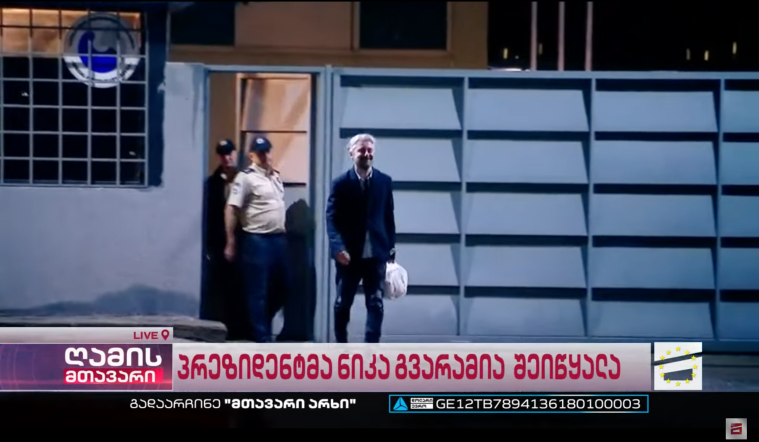On the road to Rustavi Prison #12, where the only journalist jailed in Georgia is still serving out his 3.5-year sentence, Sofia Liluashvili is speaking to me about poetry.
Liluashvili is the wife of Georgian journalist Nika Gvaramia, who spent more than a year behind bars before a pardon by President Salome Zurabishvili led to his release on June 22. Less than two weeks earlier, I and CPJ Deputy Emergencies Director Kerry Paterson were in Georgia, the country that became independent after the collapse of the Soviet Union in 1991, driving with Liluashvili to the prison holding her husband.
Liluashvili is in the back of a black SUV talking about growing up in Georgia under Soviet rule as we stop for water at a gas station known for its American-style hot dogs. We are in this car on our way to stand outside Rustavi prison and call on President Zurabishvili to release him.
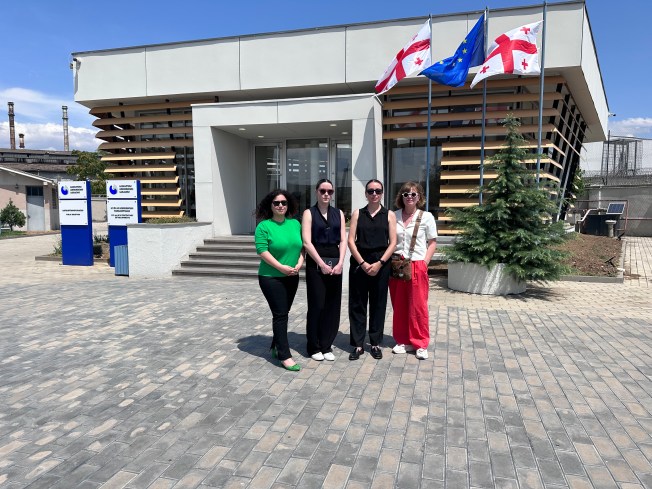
Thirteen days later, Zurabishvili would do just that.
I was part of a CPJ team in Georgia attending the ZEG Storytelling Festival and to bring attention to Gvaramia’s case, as well as broader global press freedom concerns. Our trip also gave us the opportunity to tell Liluashvili and Tamta Muradashvili, lawyer for Mtavari Arkhi (Main Channel), the opposition broadcaster run by Gvaramia before his arrest, that Gvaramia would be named as one of CPJ’s 2023 International Press Freedom Award winners – the first Georgian journalist to receive this recognition.
Miraculously, he’ll now be able to accept the award in person.
But back to poetry. We head out of the city toward the prison, known for holding political prisoners. It’s lunchtime, so cars crawl around the slender blue figures of the Merheb Fam Monuments decorating the traffic circle. Liluashvili recalls how thoughts were not your own when you grew up in Soviet-era Georgia. Presented with a poem in school, you were immediately told its meaning. There was no opportunity to let the words marinate, to attach feelings to rhythm and couplets, to create your own definitions. Being denied a chance to think for yourself was a restrictive way to live, she says.
Now, she says, there is fear among many Georgians that those days could return.
Georgia’s political climate has deteriorated since the optimistic days of the 2003 uprising, the Rose Revolution. Stark polarization over whether Georgia should tilt toward Russia or Europe has contributed to a worsening media environment in recent years; tensions over the regional impact of Moscow’s full-scale invasion of Ukraine have only deepened the country’s divisions.
Nick Lewis, CPJ’s correspondent for Central Asia and the Caucasus, says journalists have been attacked and legislation has been weaponized against independent media. In July 2021, protesters attacked dozens of journalists covering a planned LGBT-Pride march in Tbilisi – an event Lewis describes as a turning point for the media, with Georgian cameraman Aleksandre Lashkarava dying after being beaten by anti-LGBT protesters. There is also increasing concern about abusive SLAPP (Strategic Lawsuits Against Public Participation) suits brought by government officials against opposition news outlets.
This year alone, CPJ’s documentation of numerous press freedom violations in Georgia includes attacks on journalists at protests against a proposed Russia-style “foreign agent” bill that was introduced by authorities—but quickly squashed following the protests—and the suspension of accreditation for opposition broadcasters covering parliament.
Liluashvili believes the importance of freedom of expression, that ability to decide what and how to think for yourself, is directly tied to her husband’s three-and-a-half-year jail sentence. In Georgia, she says, it’s important to be able speak freely.
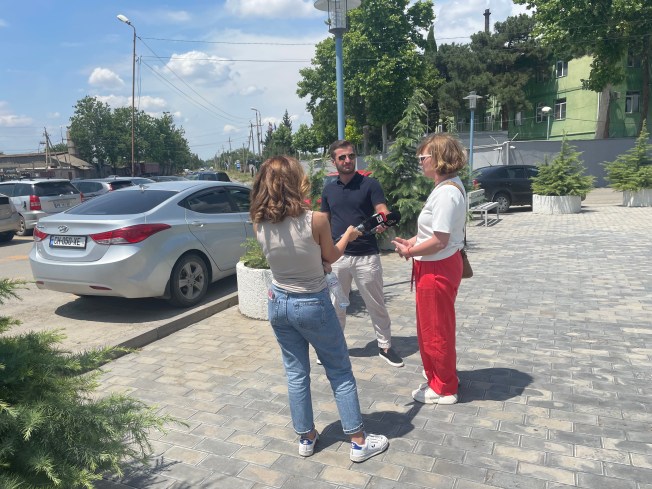
Gvaramia, the only journalist in Georgia sentenced to prison in retaliation for his work since CPJ started compiling records in 1992, was jailed on abuse of power charges related to his use of a company car at his previous employer, broadcaster Rustavi 2. The charges – denied by Gvaramia – were widely considered to be retaliatory, with the European Parliament describing them as “dubious” and noting that his sentence was perceived in Georgia “as an attempt to silence a voice critical of the current government.”
That government is led by the populist-conservative Georgian Dream party that Gvaramia and others decry as increasingly influenced by Russia.
Georgia’s Western aspirations are well-documented, with recent polls showing public support for joining the EU and NATO at 89 percent and 73 percent respectively. Tbilisi’s graffiti echo these numbers, as many walls are decorated with the country’s borders filled in with the colors and symbols of each institution’s flag. The European Union, which closely monitored Gvaramia’s imprisonment, called his jailing an impediment to EU membership. For Gvaramia and other opposition journalists and figures, this is a fight against a Russian-influenced government for a European future characterized by democracy and press freedom.
Challenges to Georgia’s press freedom are not new. Lincoln Mitchell, a lecturer at the School of International and Public Affairs at Columbia University and author of “Uncertain Democracy: U.S. Foreign Policy and Georgia’s Rose Revolution” and “The Color Revolutions”, told CPJ that media conditions under the previous government of currently imprisoned Mikheil Saakashvili were dire. Opposition stations were barred from broadcasting or shut down, while broadcasting offices were raided and computers pulled out of the wall with the help of sledgehammers in order to keep them off air, he said.
“It’s impossible to look at Georgia and say it’s becoming more democratic and freer,” noted Mitchell. “However, it is also dangerous to embrace too deeply the narrative [that] this is a government that is pro-Russia.”
In Tbilisi, our prison drive takes us past layers of buildings that give way to flatlands intermittently broken up by clusters of Soviet-era apartment buildings. I inhale ginger sweets and channel my pre-press conference nerves into asking Liluashvili questions. Muradashvili, as his lawyer, is allowed to visit Gvaramia daily, but Liluashvili sees him only once a month. She always brings him books and food and says he does not complain about conditions in the prison. She is used to this drive more than a year into her husband’s imprisonment, but as she won’t be going inside today she sees this visit as a business, rather than personal, trip.
Closer now to Rustavi, an industrial city of around 100,000 people, Liluashvili recounts details of her previous prison visits. One image stands out: the handprints left on the glass pane separating visitors from prisoners. Some big, some small, the prints haven’t, for some reason, been wiped away. The smudged ghosts of the yearning to touch a loved one haunt her. We are struck by how she speaks about Gvaramia not only as her husband and father of their three children, or even as a well-regarded journalist, but as someone she truly admires.
Local TV crews are waiting as we step into the blistering early June heat. Liluashvili, dressed in the red and white colors of the Georgian flag, dons a pair of spherical Dr. Strangelove-style glasses and continues sharing stories about Gvaramia, who, she says, knows we are outside today. She recalls a post-World Cup 2022 prison visit when his voice was hoarse from celebrating Argentina winning the tournament.
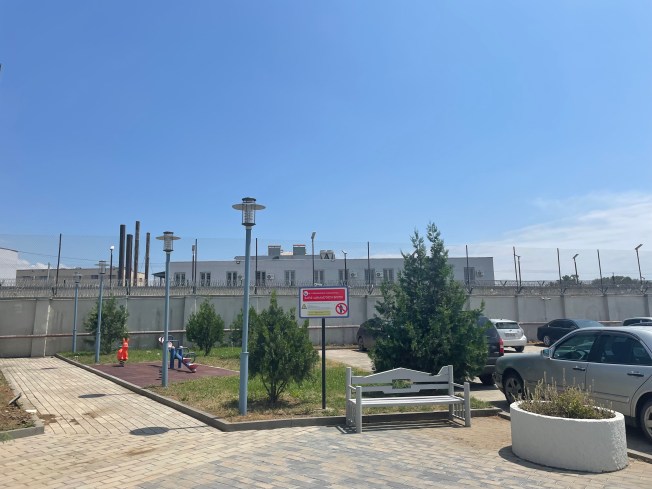
I notice a tiny, seemingly new children’s playground composed of a seesaw and a rabbit on a spring, little handles poking out of its cheeks, sitting next to the glass-and-wood façade of the prison’s similarly fresh-looking reception building. It looks displaced, a mistake in the scenery, in front of the barbed wire-topped high white walls and the guard tower that looms nearby. The only shade is in the shallow shadows of cars or trees. Staff recognize Liluashvili and wave to her on their way into the prison.
Gvaramia’s colleagues from Mtavari Arkhi are among those who interview me, Liluashvili, and Muradashvili, before I read my comments. They are eager to report on his imprisonment, which has had a chilling effect on journalists throughout the country.
Standing in front of assembled journalists and cameras, my statement, which emphasizes that the jailing of a journalist marks a turning point for a country, is one of many calls by media freedom groups – including CPJ – for Gvaramia’s release. An April 2023 letter from CPJ to President Zurabishvili and signed by nearly a dozen media freedom organizations calling for his release received widespread attention in the country.
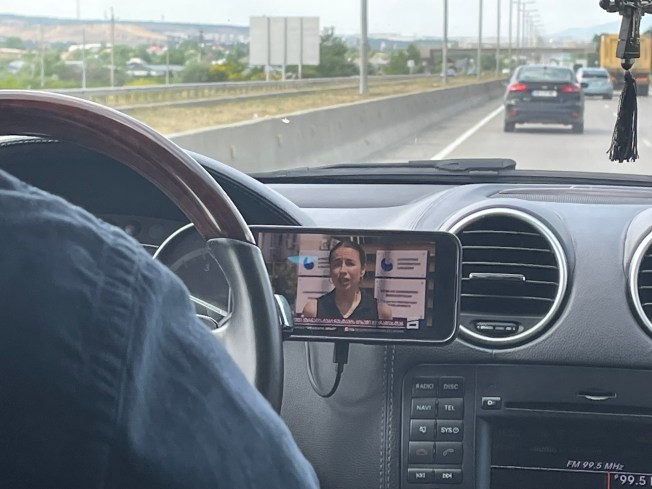
Our visit makes headlines less than an hour later on Mtavari Arkhi’s 3pm bulletin. We watch it on a phone mounted to the car’s dashboard, hurtling down the road back to Tbilisi. Next to us, Liluashvili is running Gvaramia’s Twitter and Facebook accounts, ensuring the visit is fed back out into the world in as many ways as possible. CPJ colleagues in New York and Sweden are working to push out the news coverage at the same time. I hope I’ve done justice to his family, colleagues, and everyone who has worked so hard to secure his freedom.
